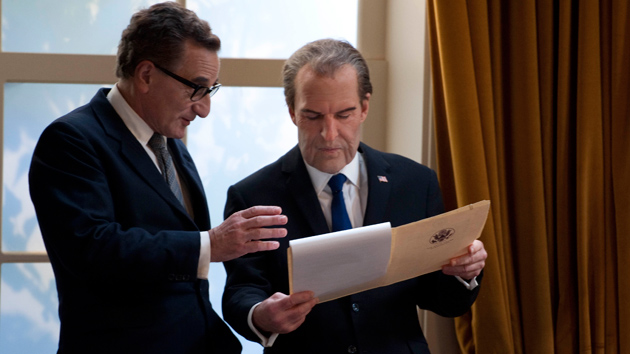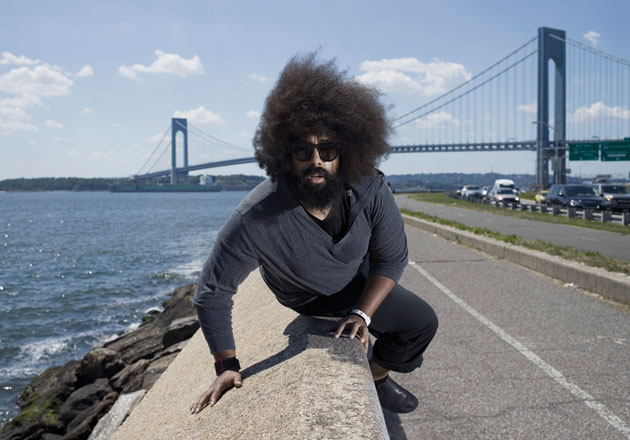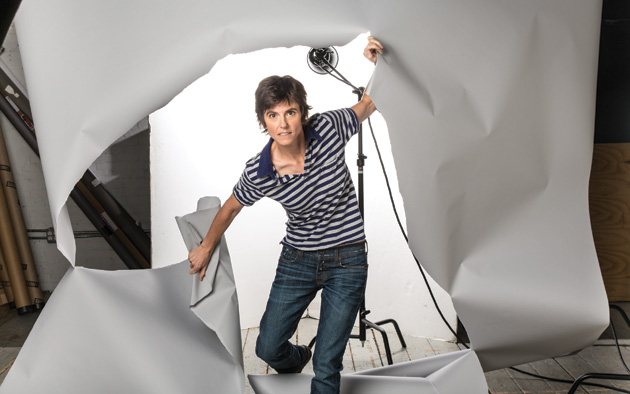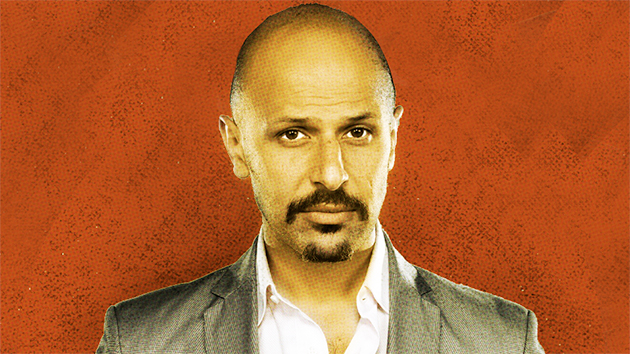
Ben Bernous
Maz Jobrani’s parents really didn’t want him to be a comedian. Perhaps a lawyer, or a prosperous businessman, as his father was before the 1979 Iranian revolution compelled the family to resettle in Northern California. But Jobrani, now 42, eventually left grad school to follow his dreams. He was cast as an expendable terrorist in a Chuck Norris flick and a reluctant one on 24 before he told his agent enough with the stereotypical roles.
He also teamed up with Egyptian-born comic Ahmed Ahmed and Palestinian American funnyman Aron Kader to perform as the Arabian Knights, whose Axis of Evil Comedy Tour led to a 2007 Comedy Central special and performances around the Middle East. Out this month, Jobrani’s new comedic memoir, I’m Not a Terrorist, But I’ve Played One on TV, highlights his attempts to assimilate, make a laughingstock of bigots, and joke his way to the top.
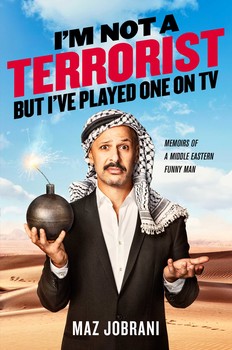
Mother Jones: You were six when your family moved here from Iran. What was the situation?
Maz Jobrani: It was late 1978. Protests were happening, but I don’t think anyone really knew that there was gonna be a revolution—everyone thought that the shah would stop it. My father was on business in New York City and he told my mom to bring me and my sister to spend the winter holidays. I always say we packed for two weeks and stayed for 35 years.
My dad owned an electric company and he brought a lot of money to America with him. He bought some properties and was able to turn them around pretty fast, and he figured, “Well, this is great, I’ll just be a real estate investor.” So he bought a bunch more properties. And then the early ’80s recession hit and he wasn’t able to get rid of the homes. The next 10 years he basically bled out most of his money.
MJ: In the book, you joke about how your parents always foiled your attempts to fit in in America.
Maz: There weren’t many Iranians in Marin. My parents had the thick Persian accent. And my dad went out and bought a Rolls-Royce! Not just any Rolls, but one of his friends’ used Rolls-Royces. My dad had so much money that anytime his friends needed money, they would go to him and be, like, “Hey, you wanna buy some suits?” And my dad would say, “Sure, why not?” Tiburon is affluent, but also very liberal and low-key—rich people there are driving Saabs, maybe Volvos, maybe Mercedes. And here comes my dad in a Silver Shadow with me in the back, and I’m like, “Oh my God!” They were the loud foreign family that just would out me all the time.
MJ: You liken your dad to Don Corleone.
Maz: I was in awe of my father. His generosity was beyond anything I ever could imagine. The reason I say he’s like Don Corleone is he was always breaking off hundreds. I’d be like, “Hey Dad, I’m going to McDonald’s with my friends,” and he’d just whip out a hundred: “Here, go, have fun.” He was larger than life, really deep voice. It wasn’t until later in life when it hit me that he drank a lot. You could say he was a functioning alcoholic. And then when I was in college, when he lost his wealth, I saw this lion who had lost his power. In the early ’90s, he decided to go back to Iran. The government told people who had left with their wealth, “Come back, we won’t persecute you.” And then he wasn’t allowed to do business or leave the country until he paid all the back taxes that were owed for the years he’d been gone. He passed away pretty much broke.
MJ: You visited Tehran again when you were in your 20s. What was it like going back?
Maz: I was really excited. I hadn’t seen my dad for almost 10 years. I remember smelling the food my aunt was cooking, and it took me back to when I was a kid in Iran. The family was amazing. At the same time it was depressing, because Tehran, even getting past the totalitarian state, was just overpopulated, overpolluted. It felt like there wasn’t much opportunity.
MJ: The hostage crisis was a tough time for Iranians living in America. What did kids say to you?
Maz: The term they used is “fucking EYE-rain-ian.” There were a handful of Persians at the school: It was my aunt and this girl named Sharona, both in the sixth grade. I’d get called a fucking Iranian by this kid. He was bigger than me, so I just kind of smiled and took it.
MJ: And then along came Flock of Seagulls.
Maz: Yeah. I ran, I ran so far away. Sharona, poor girl, she had to go through “M-m-m-my Sharona.” She got the “fucking eye-rain-ian” and she got Flock of Seagulls.
MJ: You joke that your Persian friends started pretending they were Italian. Is that true?
Maz: Absolutely. My first cousin continues to go as Tony. He worked at an Italian restaurant and they started calling him Tony and he just kept it. But my buddy Sharokh would be like, “Yeah, that girl thinks I’m Italian. Don’t say anything.” I remember I was in a San Francisco nightclub and I started talking to some girl, and it was like, “Hey, what’s going on, what’s your name?” You know, “Where are you from?” I go, “I’m from Iran.” And literally she just looked at me and walked away.
MJ: I take it your parents weren’t on board with the comedy thing?
Maz: They didn’t even know what that meant! We had a really good high school drama program, and the teacher was like, “Hey, you could do this professionally.” I told my parents that, and they kind of looked at me like, “What are you talking about?” And I was like, “You know what, my parents are right. I should just be a lawyer.”
MJ: But you chose the tougher profession. To put it in terrorist terms, what’s your kill-to-bomb rate?
Maz: [Laughs.] You get to the point where it’s like 95 to 5, or 98 to 2 sometimes. But you’re gonna bomb no matter what.
MJ: In the book, you describe one really awful show you did early on in a strip club. What were some other questionable venues?
Maz: I did a church basement—two rows of four chairs, eight people sitting, and all eight end up being performers. I did an Alcoholics Anonymous meeting that I thought was gonna be great, but there weren’t that many people there. I think I started with: “Yeah, you know, I asked the booker, ‘Where is everybody?’ and he said, ‘They’re out getting a drink!'” Total silence. I did a show at a youth hostel where I was about three minutes in with no laughter, and I go, “Who here speaks English?” And one hand in the back was raised.
MJ: Your champion, Comedy Store owner Mitzi Shore, initially wanted you to wear a robe and turban. What would you have done had she insisted?
Maz: Oh man! I think my career would have been over. You lose your integrity when you do that. Mitzi supposedly had helped build the character for Roseanne. Andrew Dice Clay and Letterman used to perform there. Leno. I mean, it was a famous club. So when that lady tells you to wear the Muslim garb, your instinct says, Oh, hell no! But there’s voices going, “Well, you know, she helped these other guys.” But I feel like I would’ve ended up being a one-trick comic, and I just wouldn’t have been able to live with myself. And then imagine if September 11 happens and here I am, the turban comic? I’m so happy I didn’t do that!
MJ: You write that you considered quitting comedy after September 11.
Maz: I’m a very positive person, but that day just felt like the day the laughter died. It wasn’t as much about, “Oh, I’m of Middle Eastern descent” as, “Holy shit, 3,000 people just died.” It really hit hard for me.
MJ: You joke about how you profile yourself at airports. How real is that?
Maz: The first time I flew after September 11, I honestly was a little paranoid. As I was going to the metal detector, I was looking at my duffel bag and I’m like, “Do I have anything that’s like a weapon?” I was really paranoid they were gonna find something sharp and I was gonna get in trouble. That’s what led to the joke about how I’m like, “Check my bags! Check my bags!” The metal detector goes off, and they’re like, “It’s your belt buckle, sir,” and I’m like, “There’s gotta be more! I’ve gotta have something!”
MJ: When you first visited the Middle East, you and your partners were already rock stars there. How did that happen?
Maz: I always say it’s kind of like Waiting for Godot. Middle Easterners were waiting for comedians. After September 11, it was such a negative time that Middle Eastern people were looking for someone to be their voice, and we happened to be there. Next thing you know, we get a call from Jordan: “We’d like you to come do shows here.” I was like, “I’d love to, but the show’s in English.” And he’s like, “Yeah, I’m speaking English to you right now, you idiot!” So we go to Jordan, Lebanon, Dubai, Kuwait, and Egypt—and we were rock stars.
MJ: When you perform in places like Saudi Arabia, where they have Sharia law and women aren’t allowed to drive, do you avoid culturally sensitive topics?
Maz: I don’t talk about that stuff anyway. But the first time we went to the region, every promoter would say, “No sex, no religion, no politics.” And jokingly, we’d be like, “Well, there goes my whole set!” In the Middle East you’re doing theaters, and people will be bringing their kids. So part of it is, listen, you can cuss a little, but don’t go humping the chair. “Politics,” they mean local politics, so if you’re in Dubai, you can make fun of the president of Iran, but don’t talk about the leader of Dubai. Yes, I could go onstage and do 45 minutes about, “What’s up with your women having to be covered and they can’t drive.” But do I want to offend them, or do I want them to laugh?
MJ: Which country have you found the most challenging?
Maz: Probably a couple of the Saudi shows. The most recent show I did was a public show. To my left were all guys, to my right mostly families—they didn’t let them sit next to each other. I would do a penis joke and the guys would laugh. And then I would do a political joke and the other side would laugh. I do a joke about how, when you have two kids in the house, you have to be ready to go at any time, anyplace—like a Navy SEAL. So the other day, the kids were sleeping, I went to my wife and I go, “Hey, let’s have some sex.” She goes, “I’m not in the mood.” I go, “I’m not in the mood either, but the enemy’s sleeping! Let’s go, let’s move it, gotta kill bin Laden.” So the joke is, I turn to the crowd and I go, “That’s right, folks, that’s what we call sex in my house: killing bin Laden. And sometimes we go weeks without killing bin Laden.” Here I am in Saudi Arabia, where the bin Laden family is actually respected. It was another one of those lukewarm situations.
MJ: The Middle East is even crazier than usual right now. Is that good for your act?
Maz: The fact is, the Middle East has been going crazy for 50, 60, 70 years. So it’s not like, “Oh, I need an ISIS joke.”

